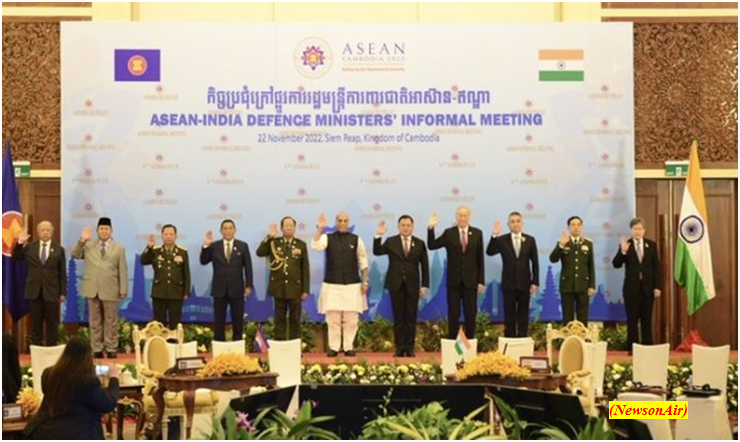India-ASEAN Defence Ministers’ Meet (GS Paper 2, International Organisation)

Why in news?
- Recently, the maiden India-ASEAN Defence Ministers’ Meeting was held at Siem Reap, Cambodia to commemorate the 30th Anniversary of India-ASEAN relations in 2022, which has also been designated as ‘ASEAN-India Friendship Year’.
- The meeting was co-chaired by Raksha Mantri Rajnath Singh and Deputy Prime Minister and Minister of National Defence of Cambodia General Tea Banh.
Background:
- India-ASEAN relationship was elevated recently to Comprehensive Strategic Partnership during the ASEAN-India Summit held in Cambodia.
Major initiatives proposed by India:
- India proposed two major initiatives for further expanding the scope and the depth of the India-ASEAN defence relations.
- One of the initiatives was the ‘India-ASEAN Initiative for Women in UN Peace Keeping Operations’ which includes conduct of tailor-made courses for women peacekeepers of ASEAN Member States at the Centre for United Nations Peacekeeping in India and conduct of a ‘Table Top Exercise’ in India for women officers from ASEAN incorporating facets of UN peacekeeping challenges.
- The second initiative was ‘India-ASEAN Initiative on Marine Plastic Pollution’ which includes channelising of the energy of the youth towards addressing the critical issue of marine pollution.
- India suggested coordination between the NCC and the equivalent youth organisations of ASEAN countries for a collective effort in this direction in the region.
- It also proposed establishment of an India-ASEAN Marine Pollution Response Centre at Chennai by the Indian Coast Guard to address and supplement regional efforts to deal with marine pollution incidents.
Way Forward:
- In conclusion, the forum recognised the importance of the India-ASEAN ties for ensuring peace and stability in the region.
- It preceded the 9th ASEAN-Defence Ministers Meeting’ (ADMM) Plus.
Tamil Nadu gets its first biodiversity heritage site
(GS Paper 3, Environment)
Why in news?
- Recently, the Tamil Nadu Government declaredArittapatti and Meenakshipuram villages in Madurai district the first biodiversity heritage site in the State.
Arittapatti Biodiversity Heritage site:
- The site comprising 139.63 hectares in Arittapatti village (Melur block) and 53.8 hectares in Meenakshipuram village (Madurai East taluk) will be known as the Arittapatti Biodiversity Heritage site.

Fauna:
- Arittapatti village, known for its ecological and historical significance, houses around 250 species of birdsincluding three important raptors - birds of prey, namely the Laggar Falcon, the Shaheen Falcon and Bonelli’s Eagle.
- It is also home to wildlife such as the Indian Pangolin, Slender Loris and pythons.
Geographical & Historic aspect:
- The area is surrounded by a chain of seven hillocks or inselbergs that serve as a watershed, charging “72 lakes, 200 natural springs and three check dams”. The Anaikondan tank, built during the reign of Pandiyan kings in the 16th century is one among them.
- Several megalithic structures, rock-cut temples, Tamil Brahmi inscriptions and Jain beds add to the historical significance of the region.
Background:
- To prevent the loss of biodiversity and to preserve the cultural and architectural heritage of bygone times, the State government, upon the recommendation of the Tamil Nadu Biodiversity Board has declared Arittapatti a biodiversity heritage site.
- The site has been declared as a biodiversity heritage siteunder the Section 37 of the Biological Diversity Act, 2002.
Way Forward:
- Notifying an area as a biodiversity heritage site would help in protecting its rich and exclusive ecosystem.
Andhra Pradesh focuses on climate change governance, sets up special cell
(GS Paper 3, Environment)
Why in news?
- Recently, the Andhra Pradesh government has created an exclusive Climate Change Cell (CCC) in its Environment, Forests, Science and Technology Department to implement a state action plan and make it climate resilient through improved climate change governance'.
Focus:
- Mitigation of climate change and protection of vulnerable sections of society through an inclusive and sustainable development strategy, which also enhances ecological sustainability, will be the CCC's main focus area.
- Building capacities for climate change actions (mitigation and adaptation) and addressing issues through an Ecosystem-based Approach will be the key.

Key Highlights:
- The CCC will engage with governments of other states, regulatory authorities, research and development institutions, non-government organisations as well as international institutions for exchange of information on climate change issues.
- The CCC would coordinate with the AP Pollution Control Board in preparing the Climate Change State Action Plan (CCSAP) and thereafter take focused steps to implement it.
- While it would liaise with the Centre, external funding agencies and different departments of the state government to identify new projects and schemes for implementation under the CCSAP, the CCC would also implement and monitor ongoing programmes like Green Climate Fund (GCF) and Integrated Coastal Zone Management Project (ICZMP).
Way Forward:
AP will soon come out with a Climate Change State Action plan, on the lines of the National Action Plan for Climate Change, and the new CCC will be tasked with its implementation.




